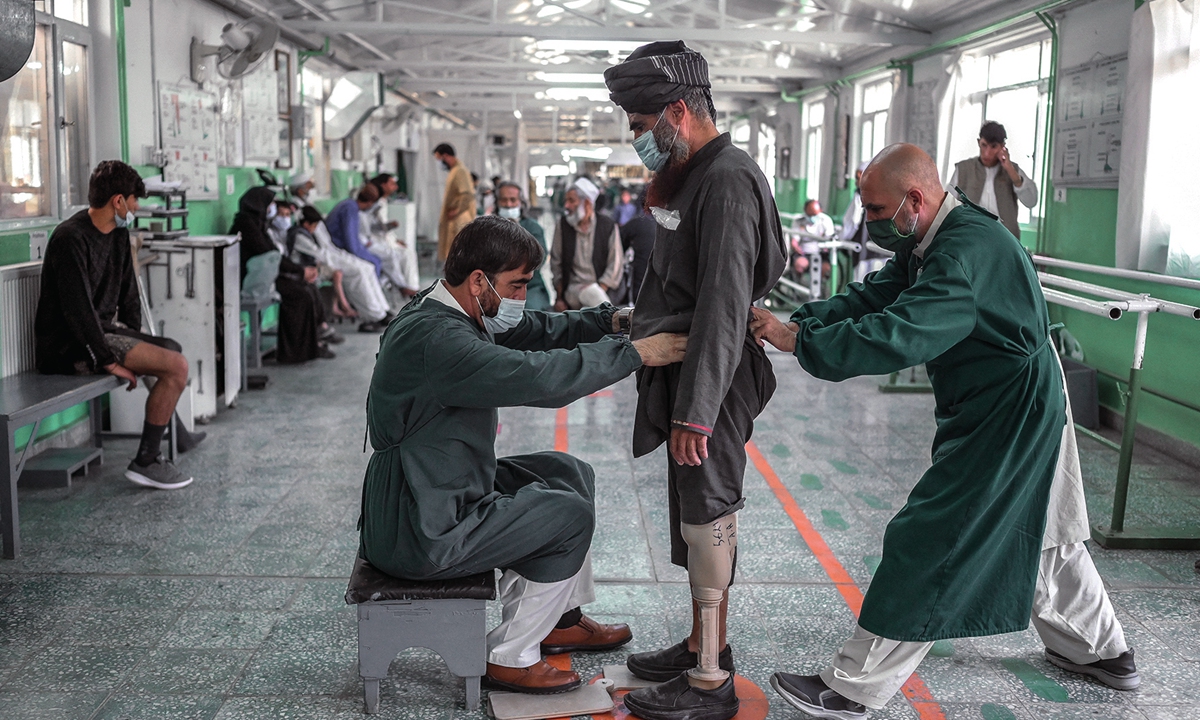Worrying humanitarian crisis across Afghanistan calls for a massive increase in assistance : UN FAO representative

The UN Food and Agriculture Organization (FAO) warned recently that the current humanitarian crisis in Afghanistan could descend into catastrophe in the coming months, with a very real chance of famine-like conditions in some areas, unless immediate large-scale support arrives very soon to save lives and protect the livelihoods of Afghans.
Herat one of Afghanistan’s 34 provinces has an area that is heavily dependent on agriculture and livestock. It was an area that was particularly badly hit by this year’s drought, the worst for more than 35 years.
Wheat is the backbone of rural livelihoods across the country. Herat has some irrigation but most farmers depend on the rain for their crops. This year the farmers had to struggle badly because they have lost their wheat harvest due to the drought, and they have no seeds or cash. So they are struggling.
They have gone into massive debts. They have no food in their homes, no money, no seeds and in many cases, no hope. It is a deep economic crisis in which there is just no money, and many families are starting to feel the cruel bite of hunger.
There has been extensive displacement of People and families. Several of the farmers spoke about family members having gone elsewhere, to the towns and cities of Afghanistan, to Herat, to Kabul as well and even outside Afghanistan. But there are no work to be found in the towns, no jobs whatsoever at all.
This is why FAO’s work is so important. Farmers are being given 50 kilos of really good-quality seeds that are produced in Afghanistan. With these seeds they can grow enough seeds to feed their family for a whole year. And how much does this cost FAO? About $150 per family. So little when the return is so great.
You could see their happiness in their faces when they received seeds. When farmers have seeds growing in their fields they know they are able to stay.
Whole families of farmers who had been forced to leave their villages were now living on the streets of Herat. The decision to leave your land with your children, with your whole family, the land where your fathers, mothers and grandparents have also farmed is a really big one. But they just had no choice, no other option.
The men, women and children need enormous amounts of humanitarian assistance in the coming months, Just to keep them from falling further into the hunger trap. Hopefully, more and more people around the world are understanding there is a really worrying humanitarian crisis across Afghanistan.
This drought crisis, which was largely in rural areas, became transformed to something very difficult over the last few months as a result of the economic implosion that has gripped the economy and country. There’s been a total liquidity crisis.
The banks are hardly working. Business has just stopped. There was the sudden suspension of the international development assistance, which for so many years had been the foundation of many basic services, including health, education and of course, agriculture.
So firstly, what is needed is to ensure across the humanitarian community is a massive increase in humanitarian assistance; critical support to keep farmers in their fields, and support for food and health, particularly for children who are becoming severely and acutely malnourished.
70 percent of the Afghan population live in rural areas, and 80 percent of household livelihoods depend on agriculture directly or indirectly. This is why Afghan farmers also need to have a massive increase in humanitarian assistance.
And what is FAO doing as a technical agency ? FAO has been working in Afghanistan for more than fifty years, working with farmers and livestock owners to improve their production, boost their livelihoods and transform food systems.
But today, their focus is on keeping agricultural livelihoods going. Today they are seeking $115 million so that farmers can be provide urgent and immediate support in four things. One, wheat seeds. Wheat is the backbone of household food consumption, but also for income as well.
And tragically, although The organization has procured about 10,000 metric tons, which is enough to feed almost 1.5 million people for a whole year. But there are 6,500 thousand tons of seeds unsold, sitting in warehouses. These should be in fields.
Secondly, animals are starving. Farmers can’t keep them alive. At the moment, they don’t have any food. There’s no grass available, et cetera. So the second one is providing livestock feed.
The third one is that because people are really hungry as well as lacking energy, you see an increase in malnutrition. So the third thing is that we need to get as many vegetables and things like that into people’s gardens in spring, once the snows have melted.
And the fourth thing is cash, because people at the moment haven’t got any cash from the harvest this year.
If people don’t get that type of support soon, they will be forced to leave their farms, their livelihoods will simply collapse. When people leave their farms and cattle pastures, that’s when we will have catastrophe. And that’s what worries me. People don’t die in the fields, they don’t die with their herds. It’s when they have to leave.
For many years in Afghanistan, physical access has been a major issue. Now one can work safely in every single province. Access is no longer a problem for us. But the big new problem for is the economic crisis.
As well as driving the worsening of the humanitarian crisis, it has also made it so much harder to deliver vital life-saving humanitarian assistance. However it will be so hard to sustain current levels of support if needs continue to go up and up.
This is why it is so important that people’s livelihoods, especially in rural areas be protected, and that massive amounts of humanitarian assistance arrive now.
The support of any country that seeks to assist the people of Afghanistan during today’s crisis is being welcomed. As well as providing humanitarian assistance, which is critical, helping those that are not yet in crisis to keep going is also really important.
Indian wheat has already started reaching Afghanistan via Charbahar Port in Iran.




